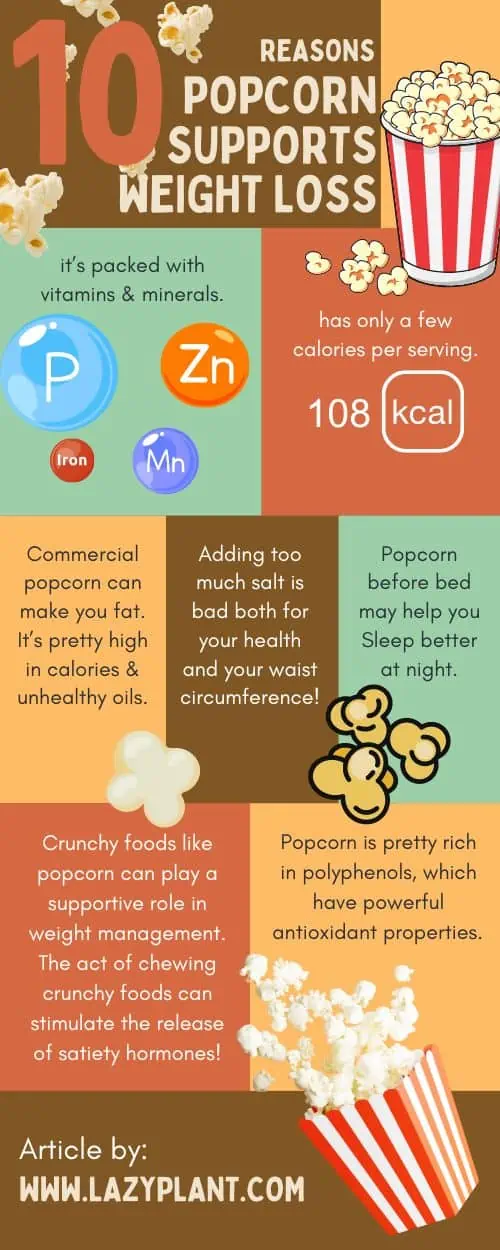A small 3-cup serving of air-popped popcorn at night without any calorie-dense toppings is good for weight loss. It keeps you full till bedtime with fewer than 110 calories!
But, high amounts of commercial, microwaved, or oil-popped popcorn can make you fat. Overconsumption of this favorite late-night snack is easy. You have to follow certain tips while cooking or serving popcorn to make them a great addition to your weight-loss diet routine.
Table of Contents
- How much Popcorn can I eat on a Diet?
- Eating popcorn at night can help you lose weight
- Popcorn before bed may help you Sleep better at night
- Can popcorn make you Fat?
- Commercial Popcorn Can Make You Fat
- Are There Healthier Varieties That I Should Prefer?
- Tips To Quickly Prepare Healthy Homemade Popcorn
- How To Cook Perfectly Air-Popped Popcorn?
- Healthy Seasoning Ideas For Popcorn
- How To Eat Popcorn To Burn Belly Fat?
- How Long Before Bedtime Can I Eat Popcorn?
- Can I Eat Popcorn Every Night?
- Tips To Prevent Weight Gaining While Eating Popcorn At Night
- How To Prevent Kernels From Getting Stuck In Teeth?
- Who Should Avoid Consuming Popcorn?
- 12+1 Myths on Popcorn on Weight Loss
- 12 Fun Facts About Popcorn
How much Popcorn can I eat on a Diet?
A typical serving size of air-popped popcorn is around 3 cups, which is equivalent to about 24-30 grams. It’s roughly equivalent to the size of a small cereal bowl. One cup is equivalent to the size of a baseball.
| Portion size | grams | ounces | Calories |
|---|---|---|---|
| 1 cup | 8-9 | 1/3 | 36 |
| 3 cups | 24-30 | 1 | 108 |
| 10 cups | 100 | 3 | 382 |
Whole grain popcorn helps you feel full with fewer calories, aiding weight management.
Can I eat too much?
While homemade air-popped popcorn is generally a healthy and low-calorie snack, it’s still possible to overeat if you consume very large quantities. The fluffiness and high fiber content of popcorn can make it satisfying, but it’s essential to be mindful of portion sizes.
Popcorn is naturally gluten-free, making it a suitable option for most people with celiac disease or gluten sensitivity.
Eating popcorn at night can help you lose weight
They’re a super filling food
Calories
Popcorn has a low caloric density, meaning you can eat a relatively large volume for fewer calories. However, this doesn’t mean unlimited consumption. Be aware of the overall calorie content, especially if you add toppings like butter or oil.
A typical serving size of 3 cups (about the size of 3 baseballs has approximately 110 calories.
Fiber
Above all, air-popped popcorn is the ideal snack for weight loss because it’s particularly rich in fiber. Air-popped popcorn contains 15.1 grams of fiber per 100g.
| Portion size | Fiber (grams) | % DV |
|---|---|---|
| 1 cup | 1.2 | 3% |
| 3 cups | 4.3 | 12% |
| 10 cups | 15.1 | 43% |
Fiber helps you feel full and satisfied for longer, potentially reducing overall calorie intake throughout the day. It slows down the digestion process, allowing you to feel fuller for a longer period and reducing cravings for fattening food.
Additionally, high fiber intake has been linked to a significantly lower risk of developing coronary heart disease, stroke, hypertension, diabetes, obesity, certain gastrointestinal diseases, high blood pressure and high serum cholesterol levels.[2]
Popcorn has twice the fiber per serving than whole-wheat bread.
Popcorn is Whole Grain!
Consuming popcorn as a whole grain can contribute to a balanced and nutritious diet, potentially supporting various aspects of your health and well-being.
Diets high in whole grains have been linked to reduced risk of obesity and cardiovascular disease, including coronary heart disease, hypertension, and stroke, improved gut health and decreased risk of cancers of the upper gut and lower mortality rate.[3,4]
According to studies, people who regularly consume popcorn have:[5,6]
- 250% higher intake of whole grains
- 22% higher intake of fiber
- less meat consumption
Air-popped popcorn is the only food that is 100% whole grain by weight.
Glycemic Index
The glycemic index (GI) of popcorn varies depending on the type of popcorn, how it’s prepared, and any toppings or seasonings added. However, air-popped popcorn generally has a GI of 50-55, which is considered low to moderate.[7]
Here’s a breakdown of the glycemic index of popcorn:
- Air-popped popcorn: 50-55 (low to moderate)
- Microwaved popcorn: 55-65 (low to moderate)
- Movie theater popcorn: 70-85 (high)
Adding sugary toppings to popcorn can greatly increase its glycemic index.
It’s important to note that GI is just one factor to consider when it comes to blood sugar control. Glycemic load (GL) also plays a role. GL takes into account both the GI of a food and the amount of carbohydrates in a serving.
Popcorn generally has a low glycemic load, even for varieties with a higher glycemic index, because it’s relatively low in carbs.
Popcorn doesn’t spike blood sugar levels, as it has a low to moderate Glycemic Index.
Are popcorn Keto-friendly?
The keto diet typically restricts daily net carb intake to 20-50 grams, depending on individual goals and metabolic factors. Popcorn can fit into a keto diet in moderation as long as it stays within your daily carb limit. One cup of air-popped popcorn contains about 5 grams of net carbs.
Overall, popcorn can be a healthy snack option for people with diabetes, people on keto, or those looking to manage their blood sugar levels. However, it’s important to choose air-popped or minimally processed popcorn and avoid adding sugary toppings, like caramel.
Supports Gut Health
Moreover, fiber in popcorn feeds the good bacteria in the gut. It contributes to healthy gut microbiota, which is crucial for good health. Gut microbiota protects the body from chronic inflammations, improves metabolic processes, and promotes weight loss, due to the regulation of appetite![8]
Does popcorn burn belly fat?
Popcorn alone does not directly “burn” belly fat. There’s no magic food that specifically targets fat burning in a particular area like the belly. However, popcorn can be incorporated into a healthy diet that supports overall weight management, which may indirectly contribute to reducing belly fat as part of overall weight loss.
Regulates Appetite & stimulates Fat metabolism
Popcorn is healthy. It’s a whole-grain food rich in minerals and vitamins that are necessary for a good metabolism. They help the body burn more fat, preserve lean mass, improve Body Mass Index, and reduce waist circumference.[9,10,11,12,13]
| Nutrient | Amount | % DV |
|---|---|---|
| phosphorus (mg) | 85 | 12,2% |
| zinc (mg) | 1,0 | 8,9% |
| magnesium (mg) | 37 | 8,8% |
| riboflavin (mg) | 0,1 | 6,1% |
| tryptophan (g) | 0,0 | 5,7% |
| selenium (mcg) | 2,8 | 5,1% |
| thiamin (mg) | 0,1 | 4,7% |
| iron (mg) | 0,8 | 4,2% |
| vitamin B6 (mg) | 0,1 | 4,1% |
| niacin (mg) | 0,5 | 3,4% |
| pantothenic acid (mg) | 0,1 | 2,4% |
| potassium (mg) | 85 | 1,8% |
| folate (mcg) | 6,5 | 1,6% |
| calcium (mg) | 2,8 | 0,3% |
Appetite and Satiety Hormones:
- Zinc plays a role in regulating appetite hormones like leptin and ghrelin. Adequate zinc intake may help promote feelings of fullness and reduce cravings, potentially leading to decreased calorie intake.
- Magnesium may influence leptin and insulin sensitivity, potentially contributing to improved satiety and reduced hunger.
Fat Metabolism:
- Magnesium is involved in various enzymatic processes crucial for energy production and metabolism, including fat metabolism. Adequate magnesium levels may support efficient energy utilization and potentially influence fat burning.
- Selenium plays a role in thyroid function, which regulates metabolism. Adequate selenium intake may support healthy thyroid function and potentially influence basal metabolic rate (BMR), the number of calories burned at rest.
Overall Health and Weight Management:
- Iron is essential for transporting oxygen throughout the body, which is crucial for various metabolic processes, including fat burning. Low iron levels can lead to fatigue and hinder physical activity, impacting weight management efforts.
- Phosphorus is implicated in energy production and metabolism. Adequate phosphorus intake supports overall cellular function and energy utilization, potentially impacting weight management indirectly.
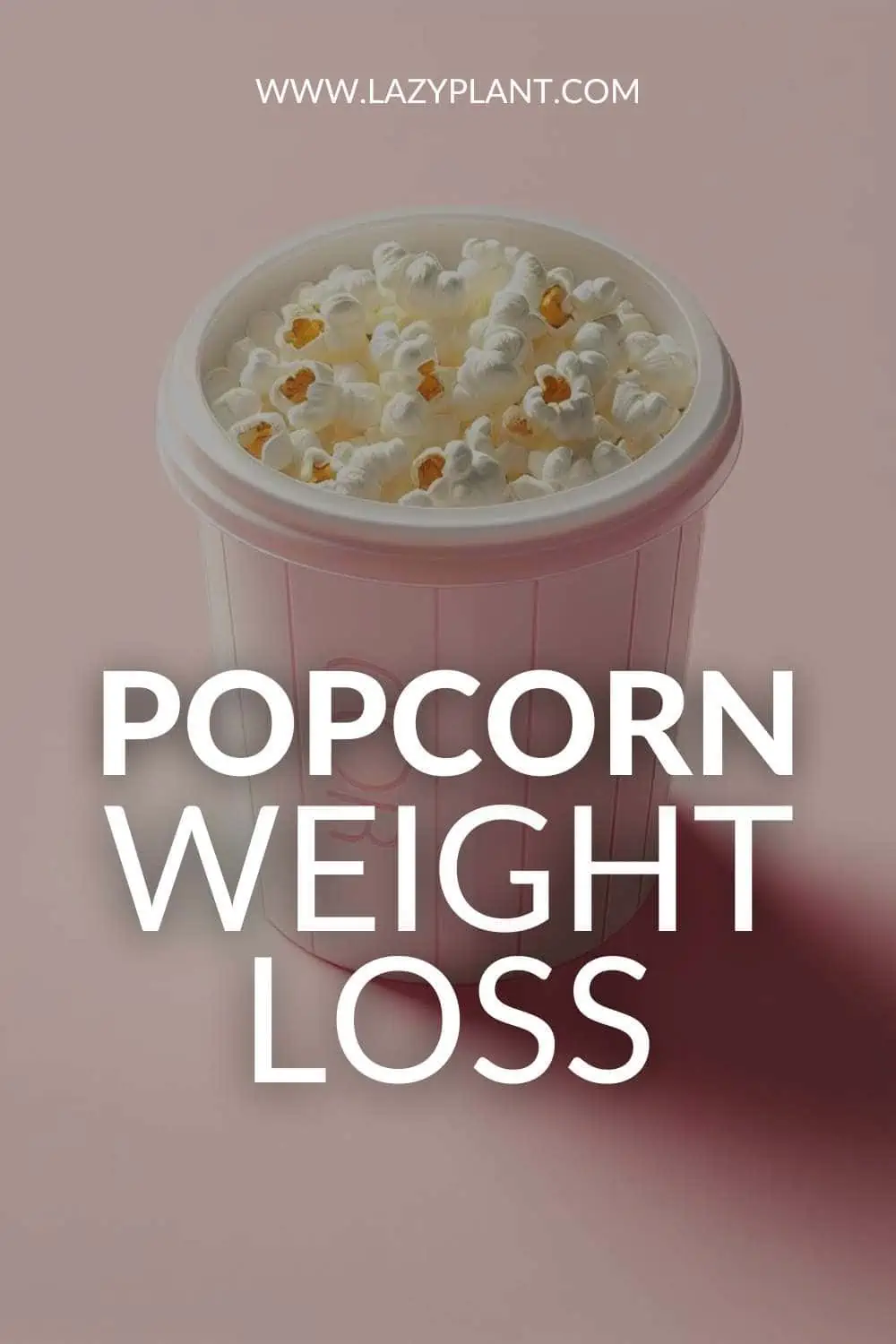
B vitamins indirectly contribute to weight management by supporting healthy metabolism and energy utilization, which can be crucial for creating a calorie deficit necessary for weight loss. For instance:
- Riboflavin plays a role in converting food into usable energy and supporting various metabolic processes. Adequate intake ensures efficient energy utilization, potentially preventing excess calorie storage as fat.
- Thiamine is essential for breaking down carbs for energy. Proper thiamine levels ensure efficient carbohydrate utilization, preventing their conversion and storage as fat.
- Vitamin B6 is involved in amino acid metabolism, which is crucial for building and repairing tissues and in the production of neurotransmitters and hormones that influence appetite and satiety.
Popcorn is an excellent source of phosphorus, magnesium, zinc, iron, and almost all B vitamins!
Benefits of Polyphenols
Furthermore, popcorn is pretty rich in polyphenols, which have powerful antioxidant properties. These are the same antioxidant compounds naturally present in fruits![5]
Adults in the US consume approximately 2,000 mg of polyphenols a day, About 240 mg or 12% come from popcorn! It’s estimated that we consume 11/2 cups (39 grams) of popcorn a day on average.
Moreover, up to 50% of the total polyphenols in popcorn is absorbed.
The popping process does not destroy polyphenols.
Polyphenols may help reduce chronic inflammation, which is associated with obesity and metabolic disorders. Also, they may improve how the body utilizes insulin, potentially aiding in blood sugar control and reducing fat storage.
Polyphenols’ antioxidant properties may combat oxidative stress, which can lead to obesity and disrupt sleep quality. Some polyphenols may improve mood and cognitive function!
If you have a hard time eating fruits and vegetables, at least eat homemade air-popped popcorn!
The role of Crunchy foods in Weight management
Crunchy foods like popcorn can play a supportive role in weight management. The act of chewing crunchy foods can stimulate the release of satiety hormones like leptin, potentially leading to feelings of fullness and reduced calorie intake.
The act of slowly savoring crunchy foods can promote mindful eating, leading to better awareness of hunger and fullness cues.
Air-popped popcorn is relatively low in calories compared to other favorite crunchy snacks.
Popcorn before bed may help you Sleep better at night
While popcorn itself isn’t a guaranteed sleep aid, it possesses certain qualities that might indirectly support better sleep under specific conditions. Popcorn contains compounds which can relax the muscles and improve sleep quality and duration.
A good night’s sleep in important for weight loss and preserving a lean body year-round.
For instance, magnesium (9% DV per serving) may improve sleep onset latency, early morning awakening, snoring, sleep duration, and daytime falling asleep. It’s particularly beneficial in elderly people.[14,15]
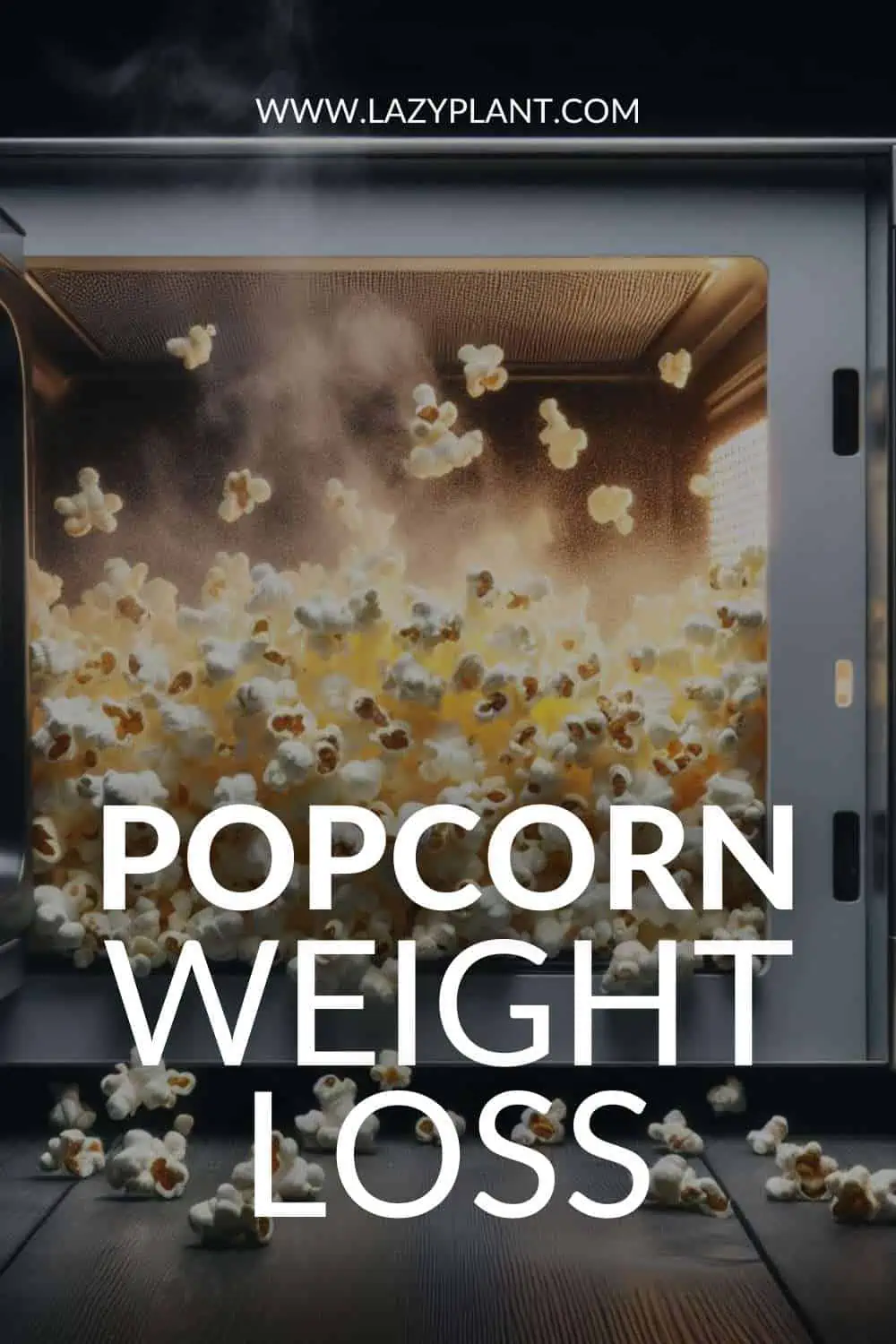
In addition, popcorn contains decent amounts of iron (4% DV), which may have a beneficial effect on restless legs syndrome, general sleep disturbances, and sleep-disordered breathing.[16]
Popcorn contains a small amount of the amino acid tryptophan (6% DV), a precursor to the neurotransmitter serotonin, which plays a role in sleep regulation. Eating various foods that enhance serotonin synthesis could play a beneficial role in a good night’s sleep.
Its effectiveness on sleep can vary greatly, though, depending on individual factors and preparation methods.
Portion control is key: Overeating any food, even popcorn, can lead to digestive discomfort and disrupt sleep.
Can popcorn make you Fat?
Popcorn per se won’t make you fat. However, there are several factors related to how you consume popcorn that could contribute to weight gain.
Large Portion Sizes
Even air-popped popcorn has calories, and overindulging can lead to consuming more calories than you burn, contributing to weight gain. A large bowl of air-popped plain popcorn can have more than 350 calories!
Mindless eating
Be cautious of consuming popcorn without being consciously aware of the quantity or even the act of eating itself. This often happens when you’re distracted by the TV and not paying attention to your body’s hunger and fullness cues.
Signs of mindless eating:
- Eating popcorn quickly without savoring the taste or texture.
- Losing track of how much popcorn you’ve consumed.
- Finishing the entire bag or bowl of popcorn without realizing it.
- Feeling overly full or uncomfortable after eating.
- Not feeling satisfied despite eating a large amount of popcorn.
Emotional Eating
Using popcorn as a coping mechanism for stress or boredom can lead to mindless overeating and contribute to weight gain.
Unhealthy Toppings
Adding excessive butter, caramel, cheese sauce, or other high-calorie, high-fat toppings significantly increases the overall calorie and fat content of popcorn, making it easier to consume excess calories.
Popcorn with added flavors such as chocolate or caramel which increase the total calories and sugar in the popcorn, can make you fat. In this case, a healthy snack that supports weight management becomes a fattening junk food.[17]
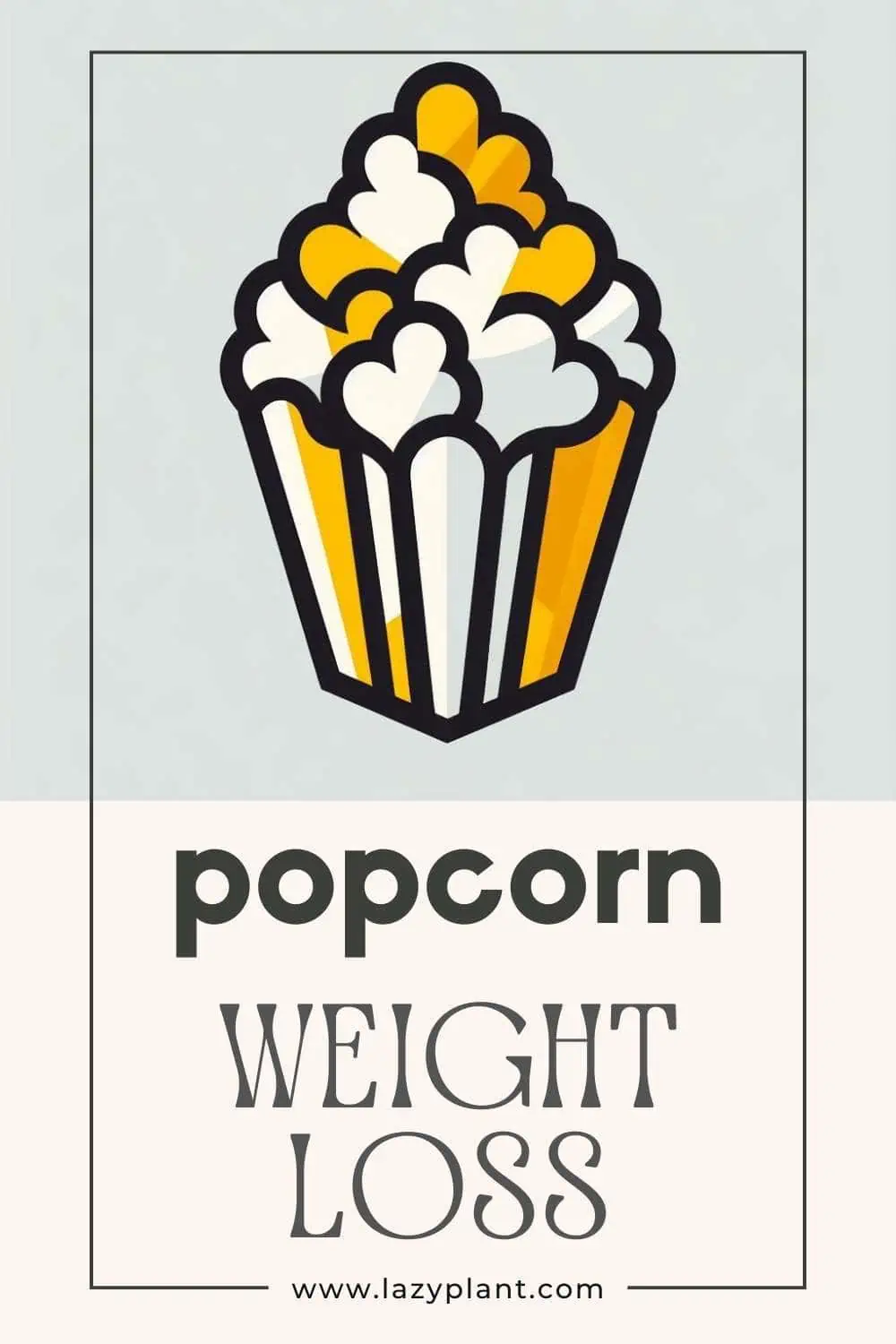
Cooking with butter
Even cooking popcorn with butter or healthy vegetable oils like canola or olive oil can contribute to weight gain under certain circumstances.
Adding butter significantly increases the calorie and fat content of popcorn. One tablespoon of butter contains around 100 calories and 11 grams of fat while a tablespoon of any vegetable oil contains about 125!
Flavored popcorn can have more than 50% calories than plain air-popped popcorn. A typical 3-cup serving of air-popped popcorn has 108 calories while a flavored, oil-popped popcorn can have 165 calories.
| Popcorn type | Calories (per 100g) | % more |
|---|---|---|
| popcorn, air-popped | 382 | – |
| caramel-coated | 400 | 5% |
| microwave, low fat | 429 | 12% |
| cheese-flavor | 526 | 38% |
| oil-popped, microwave | 583 | 53% |
Moreover, butter and oil add flavor and richness, making it easier to overeat popcorn compared to plain air-popped options.
Enjoy buttered or oiled popcorn only occasionally if you’re on a diet.
Salt
It’s no secret that popcorn taste great with salt. But adding too much is bad both for your health and your waist circumference!
While salt itself doesn’t directly cause obesity, research suggests a potential link between high salt intake and an increased risk of obesity. High salt intake may stimulate the production of ghrelin, a hunger hormone, and suppress leptin, a satiety hormone, potentially leading to increased appetite and overeating.
Also, excessive salt intake can lead to fluid retention, which can cause temporary weight gain, although this is not actual fat gain.
Deceptive Marketing
Be wary of marketing claims portraying popcorn as a “diet food” or promoting excessive portion sizes. Focus on mindful eating and making informed choices.
Ignoring other dietary Factors
Focusing solely on popcorn while neglecting other aspects of your diet, like consuming excessive sugary drinks or processed foods, can still lead to weight gain.
Commercial Popcorn Can Make You Fat
If you want to lose weight, you should eat only homemade air-popped popcorn. Commercial popcorn can make you fat. It’s pretty high in calories, salt, and unhealthy calorie-dense, low-quality vegetable oils.
In many cases, commercial popcorn cooked with coconut or palm oil can raise the level of LDL cholesterol in your blood and cause chronic low-grade inflammation in the body, as they’re high in saturated fat. This can also lead to obesity.
Moreover, commercial popcorn is usually cooked in partially hydrogenated oils, which are high in trans fats. Trans fats are dangerous for the heart.[18]
Breadsticks or rice cakes may be better snack alternatives.
Certainly, the healthiest snacks for weight loss are fruits. You can eat a banana or an apple as a quick snack between meals.
Popcorn is more filling than potato chips.[19]
Can Additives or Preservatives make you gain weight?
Additives and preservatives might indirectly contribute to weight gain. Certain additives can enhance flavor and texture, making popcorn more enjoyable and potentially leading to overconsumption. Also, preservatives allow for longer shelf life, potentially increasing the availability of popcorn and tempting more frequent snacking.
Be mindful of the ingredients and choose popcorn with minimal additives and preservatives.
Popcorn at the movies isn’t the same food as homemade air-popped popcorn. The first is high-calorie junk food, the second is a healthy, whole-grain snack.
Are There Healthier Varieties That I Should Prefer?
While all popcorn kernels essentially pop into the same fluffy snack, there are some varieties with potential benefits that you might consider:
White Popcorn has a mild flavor, making it versatile for various seasonings and toppings. White popcorn pops into smaller, more delicate pieces, offering a lighter and crispier texture compared to some other varieties. Due to its smaller size, white popcorn generally contains slightly fewer calories per serving compared to larger varieties.
Yellow Popcorn is the most common type of popcorn, known for its characteristic buttery flavor. Yellow popcorn pops into larger, fluffier pieces, providing a more substantial bite compared to white popcorn. Yellow popcorn may contain slightly more fiber than white popcorn, contributing to satiety and gut health.

Mushroom Popcorn pops into a distinctive mushroom-shaped kernel with a tender, chewy texture. The shape of mushroom popcorn allows it to hold onto toppings and seasonings more effectively. Mushroom popcorn might contain higher levels of certain antioxidants compared to other varieties.
Red Popcorn has vibrant red kernels that turn white after popping, adding a visually interesting element to your popcorn bowl. Red popcorn pops into smaller, white kernels with a flavor and texture similar to white popcorn. Red popcorn may contain certain beneficial anthocyanin pigments.
Furthermore, you can choose organic popcorn to minimize exposure to potential pesticides and herbicides, although the impact on overall health might be debatable.
Ultimately, the “healthiest” popcorn variety depends on your individual preferences and dietary needs. All options can be part of a healthy diet when consumed in moderation and prepared with healthy methods like air-popping and minimal added fats or sodium.
Popcorn vs Sweet Corn
Popcorn and sweet corn are not the same variety of corn, although they are both types of maize (Zea mays).
Popcorn is a specific type of flint corn (Zea mays indurata) known for its hard outer shell and starchy center. This unique structure allows the kernel to explode into fluffy popcorn when heated.
Popcorn is specifically grown for popping, while sweet corn (Zea mays saccharata) is intended for eating the kernels directly.
Moreover, popcorn kernels are typically smaller and harder than sweet corn kernels. Sweet corn kernels have a softer texture and a higher sugar content, making them sweeter to eat.
Both have beneficial effects on weight loss. Eating a sweet corn cob a day supports weight loss despite its sugar content. Sweet corn is rich in carotenoids and other antioxidants.
How to choose the freshest kernels?
Choosing the freshest popcorn kernels ensures optimal popping and flavor.
Fresh kernels have a shiny and smooth appearance with hard shells. Avoid dull or wrinkled kernels, as they might be old or damaged.
Choose kernels with a consistent color throughout. Discoloration or patchy shades can indicate age or improper storage.
The packaging should be free from excessive debris like dust or broken kernels, which could suggest poor handling or storage conditions.
Opt for popcorn kernels packaged in airtight containers to prevent moisture exposure and maintain freshness. If possible, choose packaging with transparent windows to visually inspect the kernels for color, consistency, and presence of foreign objects.
Pay attention to the expiration date or “best before” date on the packaging to ensure you’re purchasing fresh kernels.
Choose popcorn kernels from established brands known for quality and proper storage practices.
If you don’t consume popcorn frequently, opt for smaller packages to ensure freshness before use.
Discover high-quality popcorn kernels at budget-friendly prices on Amazon’s Best Sellers list.
Tips to store kernels for a long time
Once opened, store popcorn kernels in an airtight container in a cool, dry place away from direct sunlight and heat.
Fresh popcorn kernels pop more efficiently, resulting in fluffier and more flavorful popcorn.
Tips To Quickly Prepare Healthy Homemade Popcorn
Estimate a Serving size
You can use a measuring cup specifically designed for popcorn, or use a popcorn popper with pre-measured portion sizes. Otherwise, keep in mind that 2 tablespoons of unpopped kernels are about 6 cups popped.
Only Air-popped Popcorn is good for Weight Loss
How To Cook Perfectly Air-Popped Popcorn?
Achieving perfectly fluffy and crunchy air-popped popcorn with minimal unpopped kernels is easy if you use an air-popper maker machine. Just follow these simple rules:
- Use fresh kernels: Older kernels are less likely to pop fully.
- Don’t overcrowd the pot: Allow enough space for kernels to heat evenly.
- Don’t add oil directly to the kernels: This can make them soggy and harm the machine.
- Follow your machine’s instructions for preparation: Different models might have slightly different requirements like preheating or specific measuring spoons.
- Measure popcorn kernels: Use the measuring spoon recommended by your machine’s instructions. Remember, 1 tablespoon of kernels makes roughly 3 cups of popped popcorn.
- Listen for the popping to decrease significantly before ending the cycle.
- Transfer and season: Once the popping subsides, carefully transfer the popcorn to a bowl. Discard any unpopped kernels (You can use a popcorn scoop) and season with salt or other desired seasonings to taste.
Tips for your air-popper:
- Don’t overload the chamber: Stick to the recommended amount of kernels for your specific machine to avoid uneven popping.
- Clean your machine regularly: Refer to your machine’s cleaning instructions to maintain optimal performance and prevent burnt popcorn buildup.
- Experiment with different brands and flavors: You can try different popcorn kernel varieties or pre-seasoned options for some flavor variation.
Air Popcorn popper machines are cheap. You’ll find a wide variety from under $30 on Amazon.
Is Microwaved Popcorn healthy?
Some brands might contain artificial flavors, colors, or preservatives, which don’t offer nutritional value and raise health concerns for some individuals.
Furthermore, in the past, some brands contained chemicals, like diacetyl that have been linked to a disease called popcorn lung, which causes shortness of breath and wheezing. Diacetyl, which gives some microwave popcorn its buttery taste, is found in cheese, butter, yogurt and wine. It’s not harmful if swallowed, only if inhaled in large amounts.[20]
Microwaving popcorn offers a quick and convenient way to enjoy this tasty snack. Here’s how to do it while minimizing burnt kernels and maximizing flavor:
Instructions:
- Read the package instructions: Each brand of microwave popcorn might have slightly different recommendations, so pay close attention to the specific cooking time and any other instructions.
- Place the bag in the microwave: Position the bag according to the instructions, usually in the center of the turntable.
- Set the timer: Start with the minimum recommended time and avoid exceeding the maximum time to prevent burning.
- Listen for the popping: As with other methods, pay attention to the popping sounds. When they become infrequent, with pauses of 3-5 seconds between pops, stop the microwave immediately. Don’t wait for complete silence, as a few unpopped kernels are common.
- Let the bag rest: Wait for 30–60 seconds before carefully handling the bag, as it will be hot.
- Open the bag carefully: Direct the steam away from you to avoid burns.
- Season and enjoy: Pour the popcorn into a bowl, discarding any unpopped kernels. Season with salt, herbs, spices, or other desired seasonings to taste.

Tips for microwaved popcorn:
- Don’t add oil or butter to the bag: The bag already contains these ingredients, and adding more can lead to excessive fat and burnt popcorn. In fact, better to choose a variety with minimal added butter or oil while in a diet.
- Don’t reuse the bag: Microwave popcorn bags are designed for single use and can become damaged upon reheating, potentially causing fire hazards.
- Portion control: Even microwave popcorn, though advertised as a light snack, can be surprisingly calorie-dense. Enjoy it in moderation and be mindful of serving sizes.
Healthier alternative
If you want to eat popcorn without any added fat, or you want specific seasoning, you could microwave regular popcorn using a microwave popcorn popper. My favorite is this BPA-Free, silicone bowl. It holds 15 cups and even cleans up easily in the dishwasher.
Why does Popcorn Pop?
Popcorn kernels contain a small amount of water stored inside a soft, starchy material. This moisture is crucial for the popping process. The outer shell of a popcorn kernel is hard.
As the kernel heats up, the moisture inside turns into steam, creating pressure within the kernel. The starch inside the popcorn kernel undergoes a process called gelatinization. This means that the starch granules absorb water, swell, and become a gel-like substance.
As the moisture turns into steam and the starch gelatinizes, pressure builds up inside the kernel. The steam is confined by the hard outer shell, creating internal pressure. When the temperature inside the kernel reaches around 347 degrees Fahrenheit (175 degrees Celsius), the pressure becomes too much for the outer shell to contain.
The sudden release of pressure causes the popcorn kernel to explode or pop. The softened starch inside rapidly expands, turning the kernel inside out and forming the familiar popped popcorn shape.
The hull of the popcorn kernel becomes the fluffy white part we eat, while the popped shape is created by the rapid expansion of the starchy endosperm. The moisture content, the hard shell, and the right temperature are critical elements that make popcorn unique among other types of corn.
Healthy Seasoning Ideas For Popcorn
Savory:
- Herbs and spices: Garlic powder, onion powder, paprika, chili powder, cayenne pepper, oregano, thyme, rosemary, black pepper, smoked paprika, curry powder, za’atar.
- Nutritional yeast: Adds a cheesy flavor and a boost of protein and B vitamins.
- Sea salt and fresh herbs: Classic and flavorful, use sparingly for sodium control.
- Lemon pepper: Tangy and zesty, pairs well with herbs like dill or oregano.
- Garlic Parmesan: A popular combination, but choose Parmesan cheese sparingly for reduced saturated fat.
- Taco seasoning: Add a Mexican flair with pre-made taco seasoning or a blend of chili powder, cumin, paprika, coriander, and garlic powder.
Sweet:
- Cinnamon and sugar: Classic cinnamon sugar for a sweet and nostalgic treat.
- Cocoa powder and a pinch of sugar: Deliciously chocolaty, but control portions due to added sugar.
- Unsweetened shredded coconut and a sprinkle of cinnamon: Tropical and flavorful with a hint of sweetness.
- Dried fruit and spices: Combine diced dried cranberries, cherries, or apricots with cinnamon, ginger, or nutmeg for a sweet and tart mix.
- Maple syrup and sea salt: A subtle sweet and salty combination, use maple syrup sparingly.
- Pumpkin spice mix: Perfect for fall, combine cinnamon, ginger, nutmeg, and cloves for a warming flavor.
Tip
Dry spices on their own won’t stick well to air-popped popcorn. Lightly spray or brush the popcorn with melted butter or avocado oil before adding seasonings. This creates a surface for spices to cling to.
How To Eat Popcorn To Burn Belly Fat?
With Water
Consuming popcorn with water can be beneficial for weight loss because when the fiber of popcorn is paired with water, which is also known to contribute to satiety, the combination can help control appetite and prevent overeating. Water allows you to consume a satisfying volume of food with fewer calories.
Also, consuming popcorn with water encourages mindful eating. It’s a good practice to drink 1 glass of water before your favorite night snack. If you are still hungry after eating your popcorn bowl, you could drink another glass of water and wait for 20 minutes. Fiber expands in the stomach while water takes up space without any calories.
Moreover, water is essential for various bodily functions, including digestion. Staying hydrated can aid in the digestion of fiber from popcorn, helping to prevent constipation and promoting a healthy digestive system.
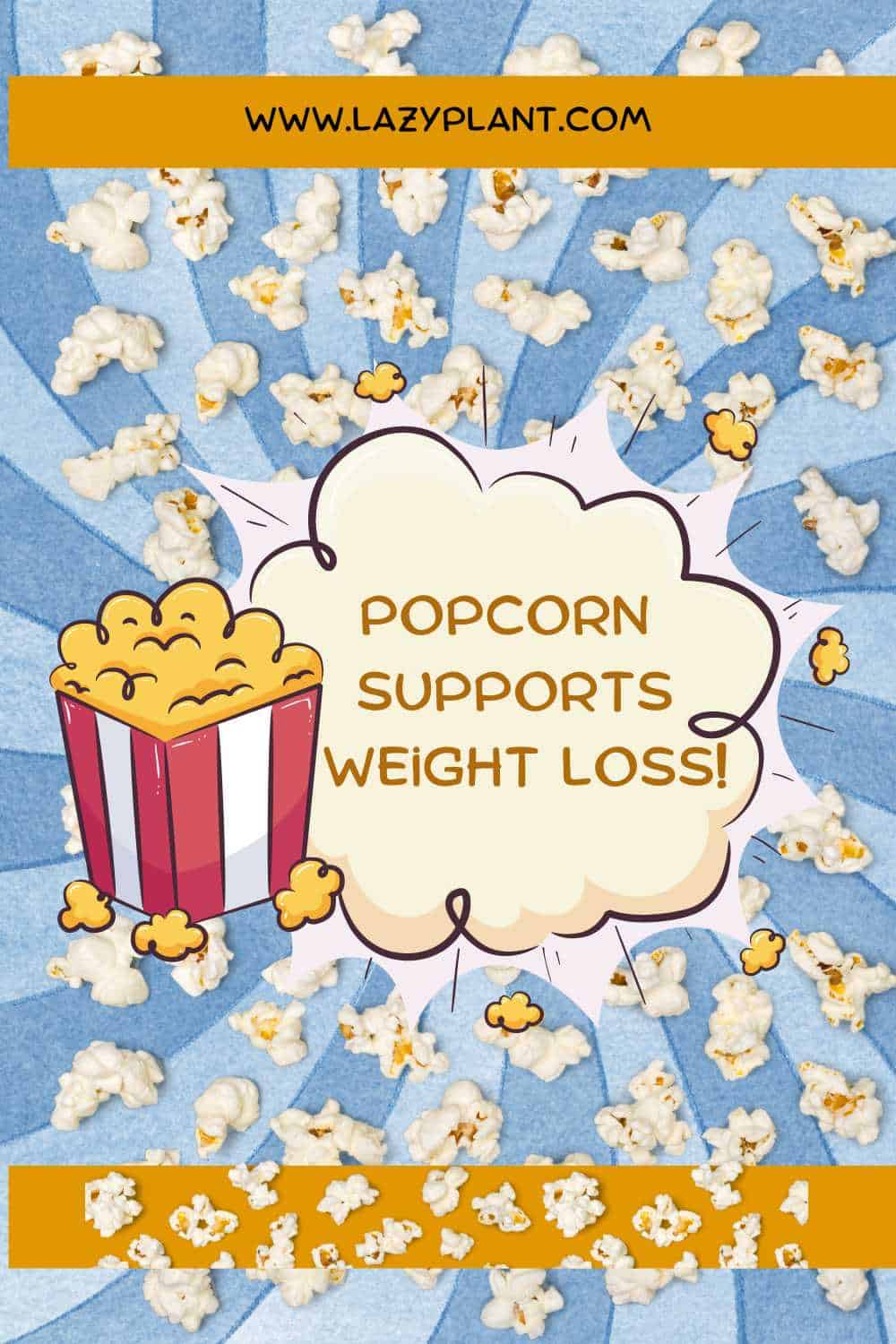
With a protein source
Having a filling and satisfying snack like popcorn with protein can curb cravings and prevent unhealthy late-night snacking on high-calorie foods.
Protein may help regulate blood sugar levels, contributing to better sleep, which can indirectly support weight management. Also, it helps you feel full for longer, potentially reducing overall calorie intake.
It has the highest thermic effect as well. About 20-30% of protein is burned during digestion!
Here are some great protein sources you can combine with popcorn for a healthy, satisfying late-night snack:
- Greek yogurt: Pair it with a dollop of yogurt for a creamy protein boost and sprinkle with chopped nuts or seeds for added texture. Greek yogurt at dinner helps you sleep better at night!
- Cottage cheese: Add cottage cheese to a healthy whole-grain toast to have a complete, super-filling night snack. Cottage cheese supports a good night’s sleep!
- Turkey slices: you can add them to your favorite late-night toast to boost protein intake.
- Hard-boiled eggs: Slice a hard-boiled egg and enjoy it alongside your popcorn for a protein and healthy fat combination.
- Edamame: Roasted or steamed edamame packs a protein punch and adds a satisfying crunch to your snack.
- Bean dip: Homemade or store-bought bean dip provides protein and fiber, making your popcorn even more filling. Choose dips made with whole ingredients and avoid excessive added sugars.
- Roasted chickpeas: Season and roast chickpeas for a crunchy and protein-packed snack.
- Kefir is the healthiest dairy product you can consume! Not only it’s packed with protein and dozens of vitamins and minerals, but also it’s the richest foods in probiotics that support gut health!
Did you know that Popcorn has protein? It has 12 grams per 100 g or 3.4 grams per a typical 3-cup serving!
How Long Before Bedtime Can I Eat Popcorn?
Try to have the last snack of the day at least a couple of hours before bedtime. According to studies, eating dinner right before bed can increase your risk of gaining weight by up to 5 times.
Can I Eat Popcorn Every Night?
Yes, you can eat reasonable amounts of popcorn every night even on a diet. However, it’s preferable to consume a variety of healthy, filling foods for good health and weight loss.
Having the same snack every night can be monotonous and potentially exclude other important nutrients. Ensure your overall diet is balanced and includes a variety of fruits, vegetables, whole grains, and lean protein sources.
Pay attention to how you feel after eating popcorn at night. If it disrupts your sleep or digestion, opt for other options.
Include other healthy options alongside popcorn to balance your nutrient intake.
After how long will I see a difference in body weight?
The time it takes to see a difference in body weight and waist circumference when making dietary changes, such as replacing calorie-dense foods with popcorn at dinner, can vary widely among individuals.
A caloric deficit is necessary for losing weight and burning belly fat. For instance, if air-popped popcorn consumption helps you consume 100 calories less a day than those you burn, you’ll lose weight.
A caloric deficit of approximately 3,500 calories is associated with a loss of about 1 pound of body weight. Therefore, if you maintain a daily caloric deficit of 100 calories, it would take approximately 35 days to lose 1 pound. It’s generally considered healthy to aim for a weight loss of 1-2 pounds per week, which corresponds to a daily caloric deficit of 500 to 1,000 calories.
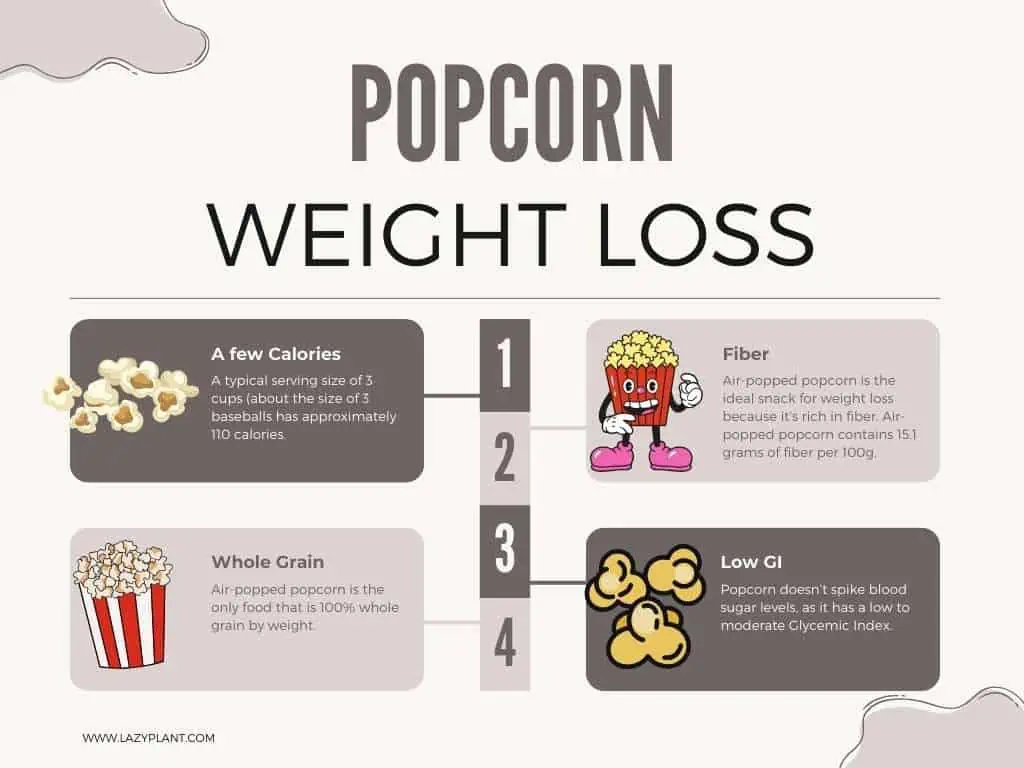
Aiming for a moderate and sustainable rate of weight loss is often recommended. Rapid weight loss can be associated with muscle loss and may not be as sustainable in the long term.
However, it’s important to note that individual factors such as metabolism, body composition, and other physiological variables can influence weight loss.
The impact of a single dietary change depends on your overall diet and lifestyle. Consistency and adherence to a healthy eating pattern are key factors.
Always consult with a healthcare professional or a registered dietitian before making significant changes to your diet or exercise routine, especially if you have specific health conditions or concerns.
Can I eat Popcorn instead for Dinner?
While air-popped popcorn can be a part of a balanced diet, replacing dinner with it every night isn’t generally recommended. You can eat popcorn every day, though, as part of a healthy, well-balanced diet. You could include popcorn as a snack or side dish alongside your dinner.
Tips To Prevent Weight Gaining While Eating Popcorn At Night
While air-popped popcorn can be a healthy snack, it’s important to be mindful to avoid weight gain when consuming it, especially at night. Here are some tips to help you enjoy popcorn without gaining weight:
- Stick to a serving size: Measure out your popcorn instead of eyeballing it. Aim for around 3–4 cups of air-popped popcorn, which is about 100–150 calories.
- Use smaller bowls and plates: This can trick your brain into feeling full with less food.
- Don’t refill: Putting your dinner in a plate or bowl is crucial while dieting. This way, you can easily manage calorie intake.
- Pair with protein: Adding a small protein source like nuts, seeds, or Greek yogurt can increase satiety and prevent overeating.
- Skip the butter and oil: Use herbs, spices, or nutritional yeast for flavor instead.
- Limit sugary additives: Avoid candy-coated popcorn, caramel drizzle, or excessive salt.
- Chew slowly: This helps with digestion and allows your body to register fullness signals.
- Stop when you’re satisfied: Don’t force yourself to finish everything on your plate.
- Eat fruits: You can eat an apple or any other fruit before or after eating popcorn if a serving isn’t enough for you.
Using smaller bowls & sticking to a portion size is crucial for weight loss: According to a study conducted among 158 people in a movie theater in Philadelphia, people who were given a large bucket ate 45% more popcorn than those who were given a medium bucket. The most surprising fact is that people with the large bucket ate 33% more popcorn, even if it was stale![21]
How To Prevent Kernels From Getting Stuck In Teeth?
Eat slowly and chew thoroughly. This allows you to detect any stray kernels before they become lodged. Chewing thoroughly also helps break down the popcorn, making it less likely to get stuck.
Drink water while eating. Water helps flush away any loose kernels that might be lingering.
Avoid sticky toppings like caramel, candy corn, or other sticky toppings that can increase the chances of kernels getting stuck. Opt for healthier seasonings like herbs, spices, or nutritional yeast.
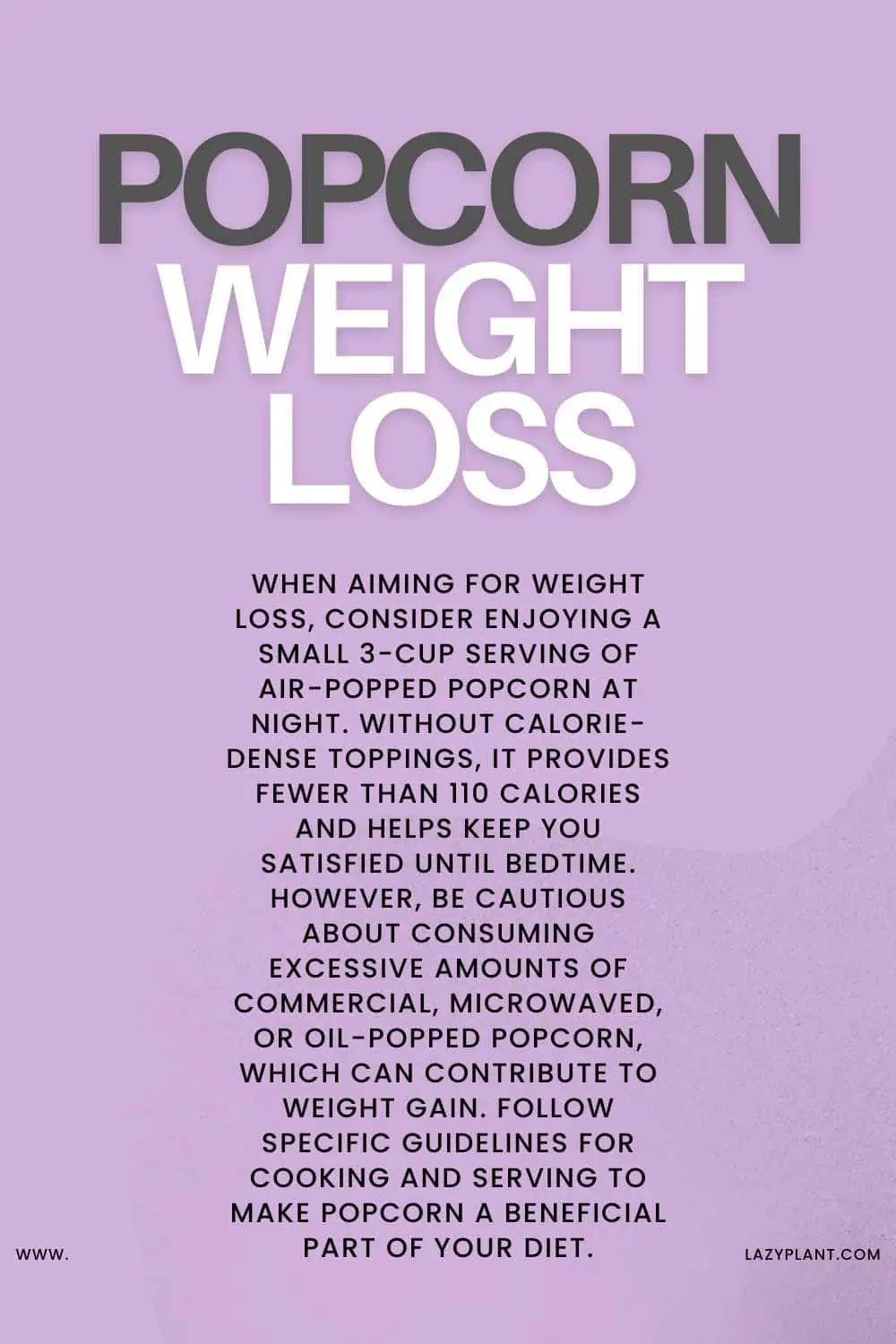
Gently floss between your teeth with a toothpick after each handful of popcorn to remove any loose kernels. Avoid using sharp objects that could damage your gums.
Thoroughly brush and floss your teeth after eating popcorn to remove any remaining kernels. Use a soft-bristled toothbrush and pay close attention to the areas between your teeth.
If you experience persistent problems with kernels getting stuck in your teeth, talk to your dentist. They can rule out any underlying dental issues and recommend additional strategies.
Who Should Avoid Consuming Popcorn?
Firstly, people with corn allergies should avoid consuming popcorn entirely.
If you have irritable bowel syndrome (IBS) or other digestive issues, high-fiber foods like popcorn may worsen symptoms like bloating and gas.
People with certain medical conditions like diverticulitis should be cautious with popcorn consumption as well. Popcorn hulls can sometimes get lodged in diverticula in the colon, potentially triggering inflammation. Discuss with your doctor if popcorn is safe for you.
If you have loose teeth, crowns, or other dental concerns, hard popcorn kernels could irritate or damage your teeth. Opt for soft, air-popped varieties.
While generally safe for people with diabetes, be mindful of portion sizes and toppings as they can impact blood sugar levels.
Due to choking hazards, popcorn is not recommended for children under 4 years old.
Always consult your registered dietitian for personalized advice regarding your specific health needs and dietary restrictions.
12+1 Myths on Popcorn on Weight Loss
Popcorn can be a healthy snack, but many myths and misconceptions surround its role in weight loss. Let’s debunk some popular ones:
Myth 1: Popcorn is a “free food” for weight loss. Fact: While air-popped popcorn is low in calories compared to many snacks, it still has calories. Mindful portion control is crucial.
Myth 2: Eating popcorn before bed helps burn fat. Fact: Timing your food intake doesn’t significantly impact weight loss unless you’re creating a calorie deficit overall.
Myth 3: Popcorn boosts metabolism due to the effort required to chew. Fact: The extra calories expended chewing are negligible compared to your overall energy needs.
Myth 4: Microwaved popcorn is healthy for weight loss. Fact: Many microwave popcorn varieties contain added fats, sodium, and artificial ingredients, making them less healthy. Opt for air-popped options.
Myth 5: Popcorn curbs cravings and helps you eat less. Fact: While fiber in popcorn can promote satiety, its effectiveness depends on portion sizes.
Myth 6: Salty popcorn is bad for weight loss. Fact: While excessive sodium intake can contribute to water retention, moderate amounts in popcorn may not significantly impact weight loss.
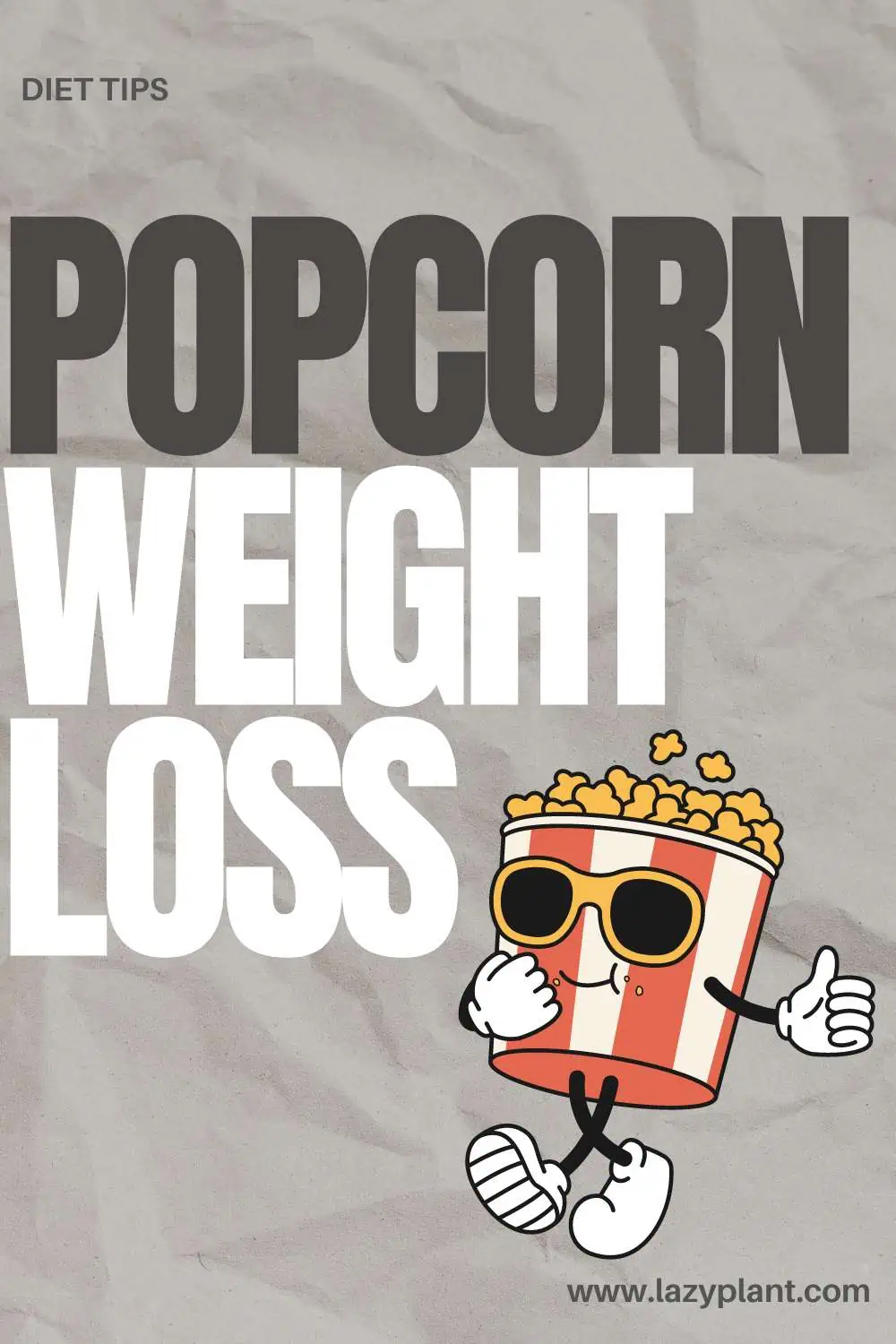
Myth 7: Adding butter and oil to popcorn increases its nutritional value. Fact: These additions increase calorie and fat content, undermining popcorn’s health benefits for weight loss.
Myth 8: Popcorn is a complete protein source. Fact: Popcorn lacks essential amino acids, making it an incomplete protein source.
Myth 9: Eating colored popcorn varieties boosts weight loss benefits. Fact: While different colored popcorn might have some unique antioxidants, their impact on weight loss is minimal.
Myth 10: Organic popcorn is healthier for weight loss. Fact: Organic doesn’t necessarily equate to lower calories or added benefits for weight loss.
Myth 11: Non-GMO popcorn is better for weight loss. Fact: The GMO status of popcorn has minimal influence on weight loss. Focus on overall diet quality and portion control. Prefer non-GMO foods, though, as non-GMO agriculture supports ecosystem balance! Also, non-GMO options provide peace of mind for people with health concerns.
Myth 12: Eating massive amounts of popcorn can still be healthy for weight loss. Fact: Calorie control is crucial. Even healthy foods like popcorn can contribute to weight gain if consumed in excess.
Myth 13: There’s a specific “popcorn diet” for rapid weight loss. Fact: Fad diets are often unsustainable and unhealthy. Aim for long-term, sustainable changes in your overall dietary patterns for healthy weight management.
12 Fun Facts About Popcorn
- Popcorn for astronauts: Due to its lightweight and long shelf life, popcorn has been a part of astronaut food supplies.
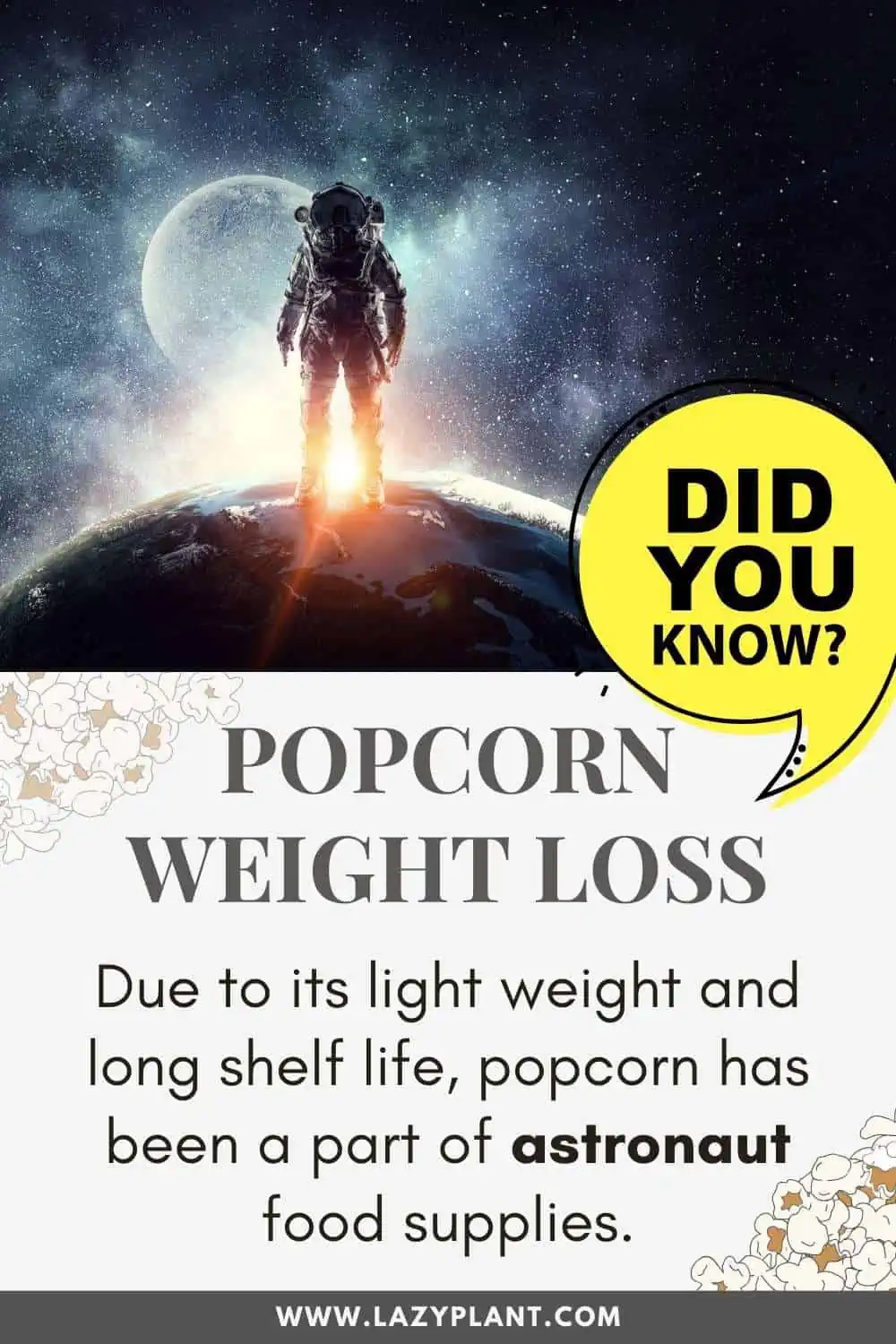
- Popcorn is an ancient snack: Archeological evidence suggests humans were popping corn kernels over 6,700 years ago!
- Popcorn at the movies: The popularity of popcorn at movie theaters began during the Great Depression as a cheap and filling snack.
- Not all corn pops: Only a specific type of corn with a hard outer shell and soft starchy center, called flint corn, can successfully pop.
- National Popcorn Day: Celebrate your love for popcorn every January 19th!
- Popcorn and your teeth: While some kernels might get stuck, popcorn itself doesn’t cause cavities. However, sugary toppings like caramel can.
- Explosive kernels: When heated, the moisture inside the kernel turns to steam, building pressure until the hard shell bursts, turning the starchy center inside out – that’s the “pop”!
- The science of the perfect pop: The ideal popping temperature for popcorn is around 160°C (320°F).
- Popcorn variety show: Colored popcorn kernels come in natural shades like red, blue, and black, with each offering slightly different flavors and antioxidant properties.
- World’s smallest popcorn kernel: Found in Peru, it’s about the size of a grain of sand!
- Popcorn and your heart: Studies suggest moderate popcorn consumption might be beneficial for heart health due to its fiber content.
- Popcorn and your digestion: The fiber in popcorn can aid digestion and promote gut health.
